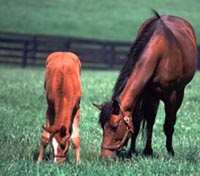International Horse Breeders Show Confidence in Kentucky
International Horse Breeders Show Confidence in Kentucky

After a devastating season last year due to Mare Reproductive Loss Syndrome, Kentucky's horse industry has gotten some good news. Statistics show that international Thoroughbred breeders are again sending their mares to the Bluegrass state in healthy numbers.
The Kentucky Department of Agriculture reports that, following required quarantine and testing of imported horses, preliminary data shows approximately 205 overseas Thoroughbred mares were received in the state in 2001. This compares to 248 mares received in 2000. Exact totals will be available in a few weeks.
"We believe these preliminary numbers show that our major overseas trading partners have confidence in Kentucky's equine industry," said Rusty Ford, equine programs manager for the KDA. "Another encouraging statistic is that 156 of these 205 mares were imported during the last quarter of 2001, and that represents a 35 percent increase in number of mares imported during the same time in 2000."
Preliminary data also shows three overseas Thoroughbred stallions were received in Kentucky in 2001. This compares to two overseas Thoroughbred stallions in 2000.
Another optimistic sign for Kentucky is the addition of 20 Thoroughbred stallions standing at stud for the very first time this year. In addition, three Thoroughbred stallions which stood in other states during 2001 are now in the Bluegrass.
Non-Thoroughbred mares imported into Kentucky from overseas for 2001 total 139. This compares to 196 for the previous year. Non-Thoroughbred overseas stallions total 23 for 2001, and 28 for 2000.
"We're very appreciative of the comfort level the international equine community is showing by bringing nearly the same number of horses to Kentucky for the 2002 breeding season," said David Switzer of the Kentucky Thoroughbred Owners and Breeders Association. "We can see no reason why the owners of horses and mares that do not reside in Kentucky should not come back in 2002."
Switzer said he believes the confidence being shown by breeders has a lot to do with the vigilance of Kentucky's horse farm managers, and the efforts of the University of Kentucky and its role in implementing an MRLS monitoring program and making prevention recommendations.
"We appreciate the excellent cooperation we've received from all our Kentucky equine industry leaders in helping develop the MRLS monitoring program, and are happy to be a part of this good news for Kentucky," said Roberta Dwyer, equine veterinarian in the UK College of Agriculture's department of Veterinary Science.
